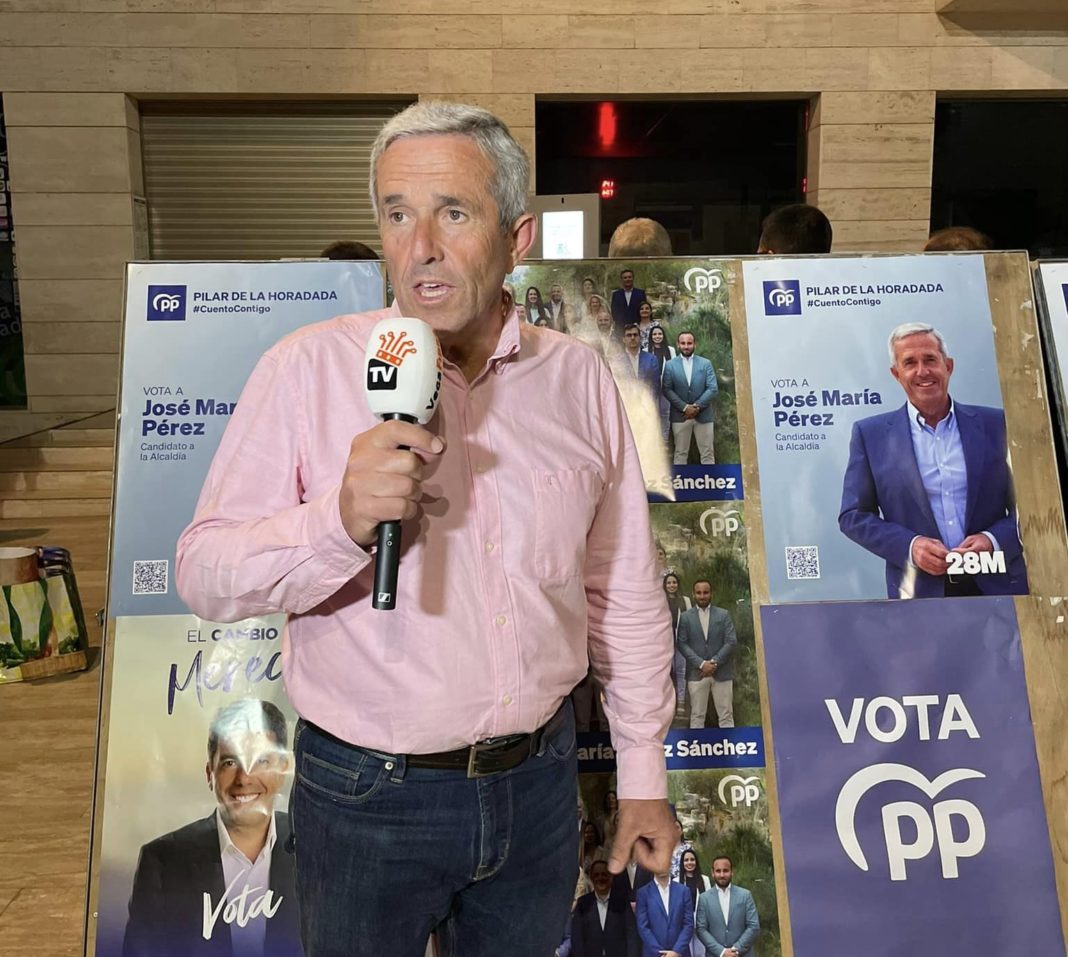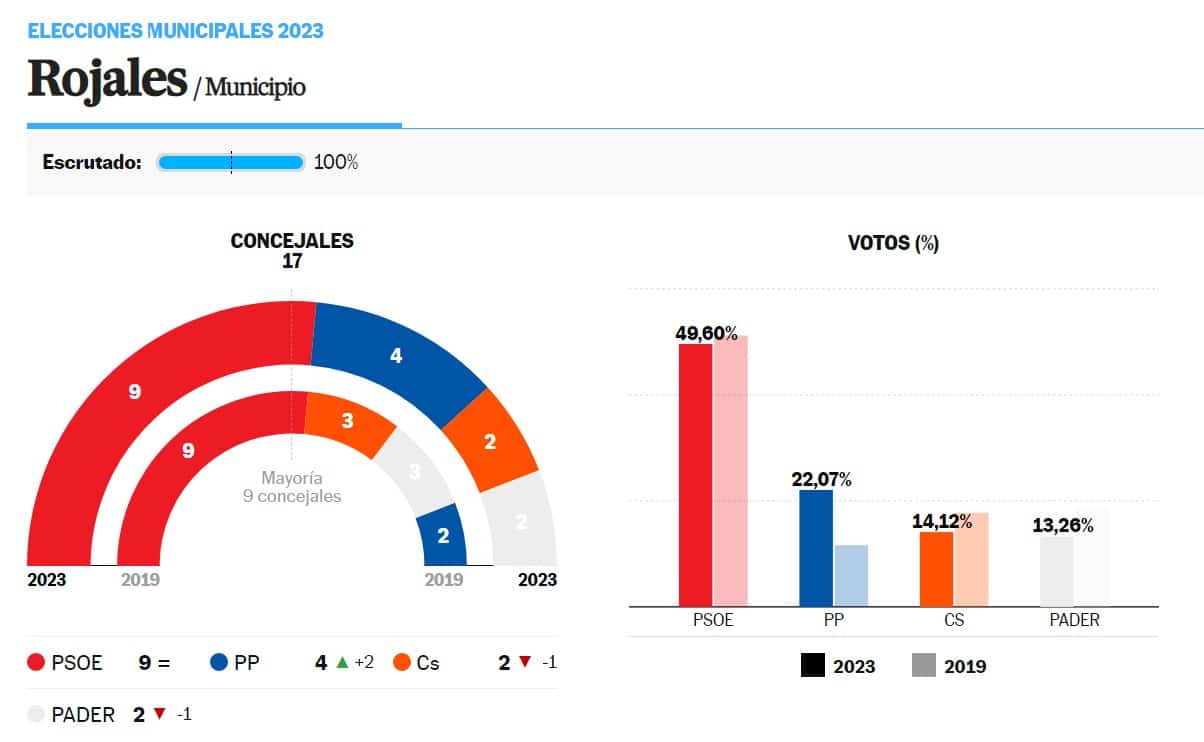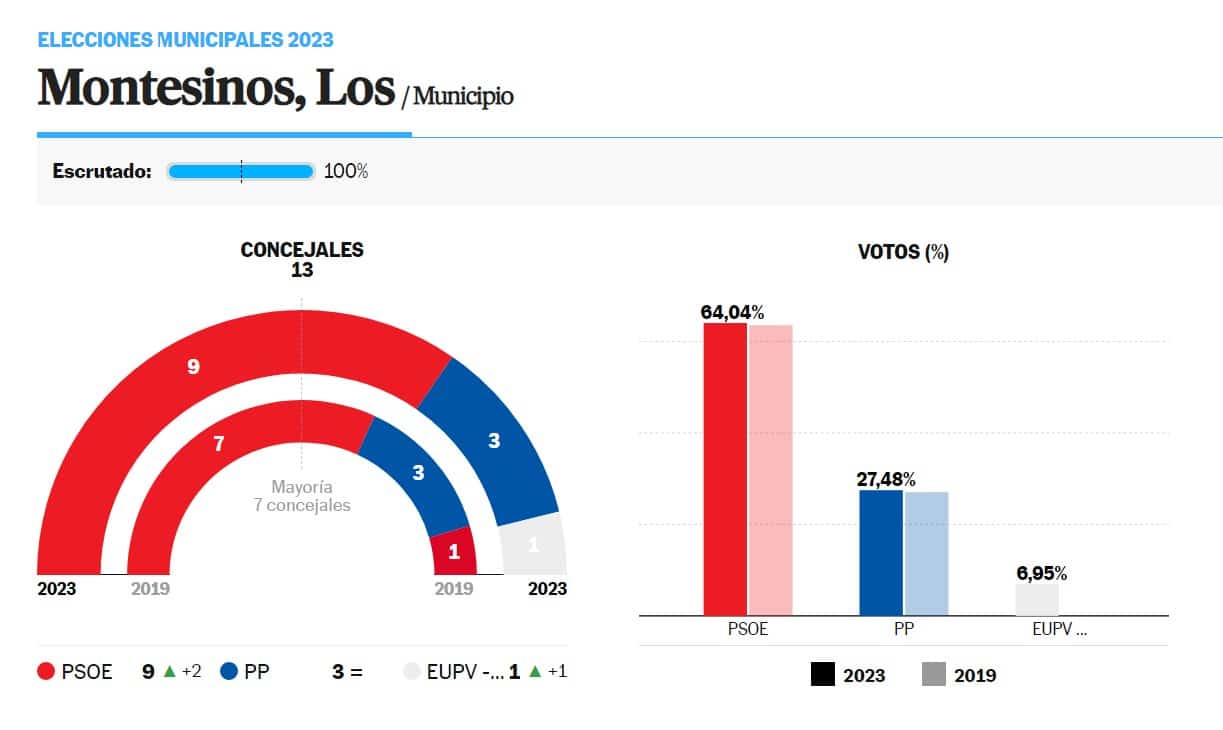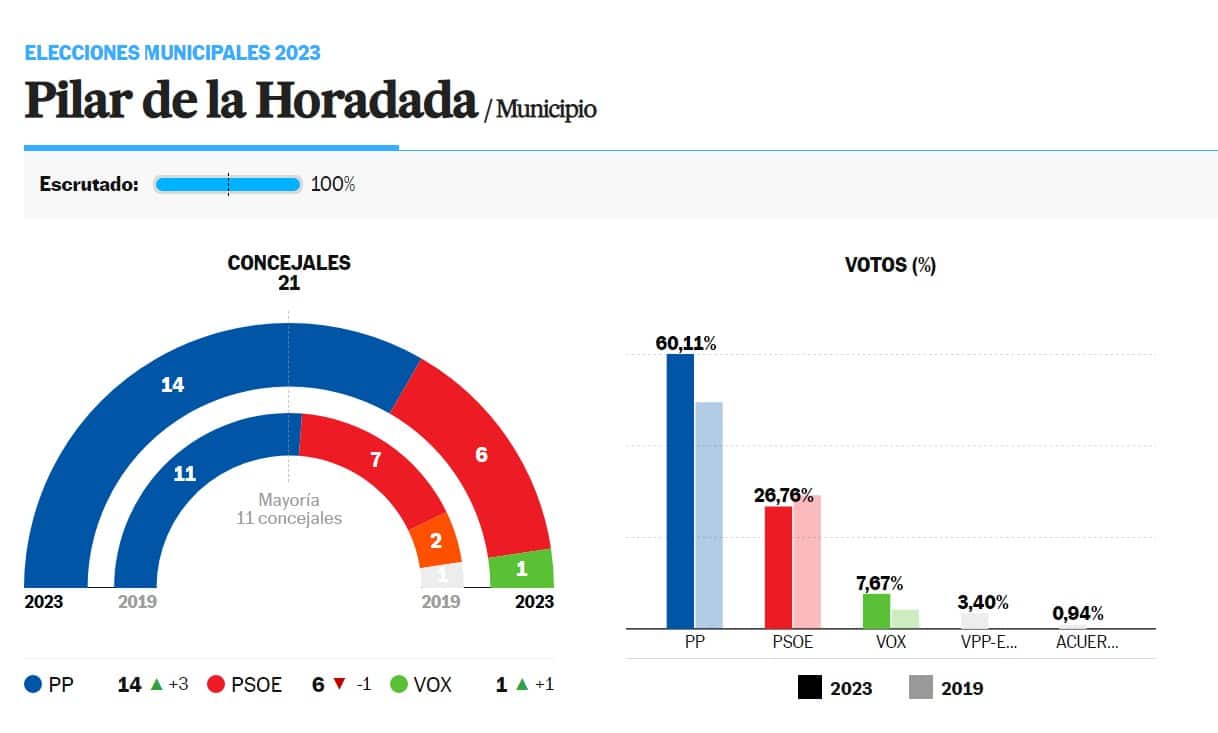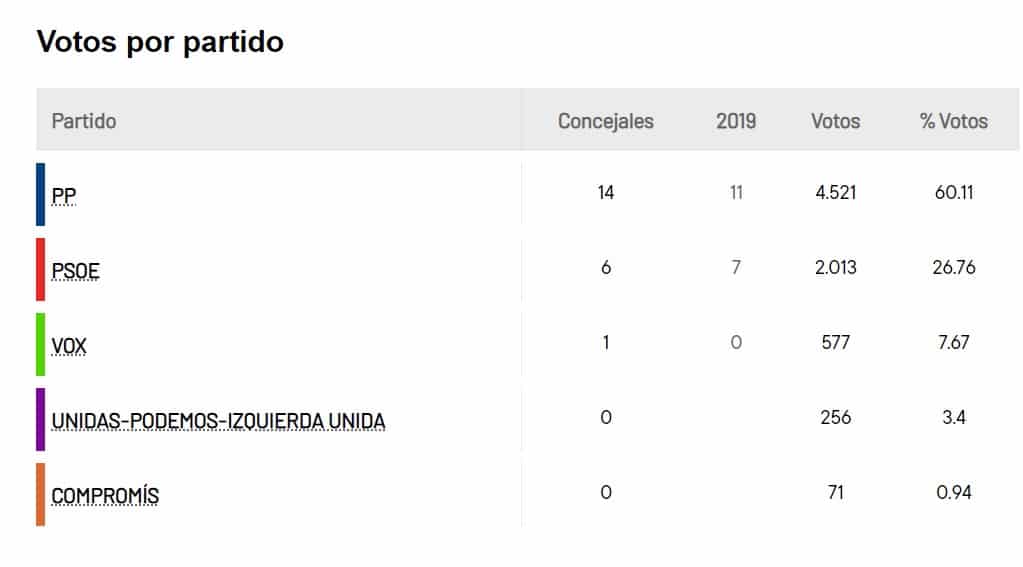- The PP have maintained their traditional fiefdoms in the Vega Baja, managing to conquer a socialist stronghold in Jacarilla, while the socialists achieved comfortable victories in nine municipalities, also winning the Mayor’s Office in Granja de Rocamora
The PP has improved it’s hold on the Vega Baja, recovering addition ground on top of that achieved four years ago, in what has traditionally been a hotbed of votes for the right. The Party has managed to win eleven absolute majorities in the Vega Baja region, compared to nine for the PSOE.
In addition, the PP could have even more mayoralties as, in three municipalities they have won the largest number of votes, including Orihuela.
One of the biggest surprises of election night is the PP majority in Jacarilla, winning the municipality from the PSOE. The party also achieved absolute majorities in Almoradí, Albatera, Catral, Redován, Cox , Bigastro, Formentera del Segura , Benijófar, Pilar de la Horadada and Torrevieja.
Meanwhile the PSOE has an absolute majority in its strongholds of Rojales, Guardamar del Segura, Dolores, Los Montesinos, Rafal, Algorfa, San Isidro and Benferri also winning, rather surprisingly, the municipality of Granja de Rocamora.
Compromís maintains its majority in Daya Vieja and C’s achieved the most votes in Daya Nueva, the only municipality which the party was able to win.
In Callosa de Segura, the PP won seven seats, one less than in 2019, losing it to the former PP councillor Javier Pérez, who with his new formation Ucin (Unión de Ciudadanos Independientes) entered the town hall with three seats. The PSOE maintains its five councillors, while the EU and Vox won a seat apiece.
In Rojales, the PSOE led by Antonio Pérez, has once again won an absolute majority with nine councillors compared to four from the PP, two from Ciudadanos, in one of their best results last night for the C’s, and two from Pader.
In Guardamar del Segura, the PSOE once again obtained an absolute majority, although this time by the minimum. José Luis Sáez will govern with nine councillors, while the PP increases to six. Vox has and the EU have a seat each.
In Albatera , the PP increases its absolute majority with 11 councillors compared to five from the PSOE and one from Vox. In Catral, the PP will govern alone with nine councillors, compared to four won by PSOE.
There was no change in San Fulgencio where the winner was the PSOE, with six councilors, including Sam Hull and Darren Parmenter, but it is not guaranteed to govern with the PP obtaining five councillors and the PIPN two, a formation that has been very critical of the socialist government.
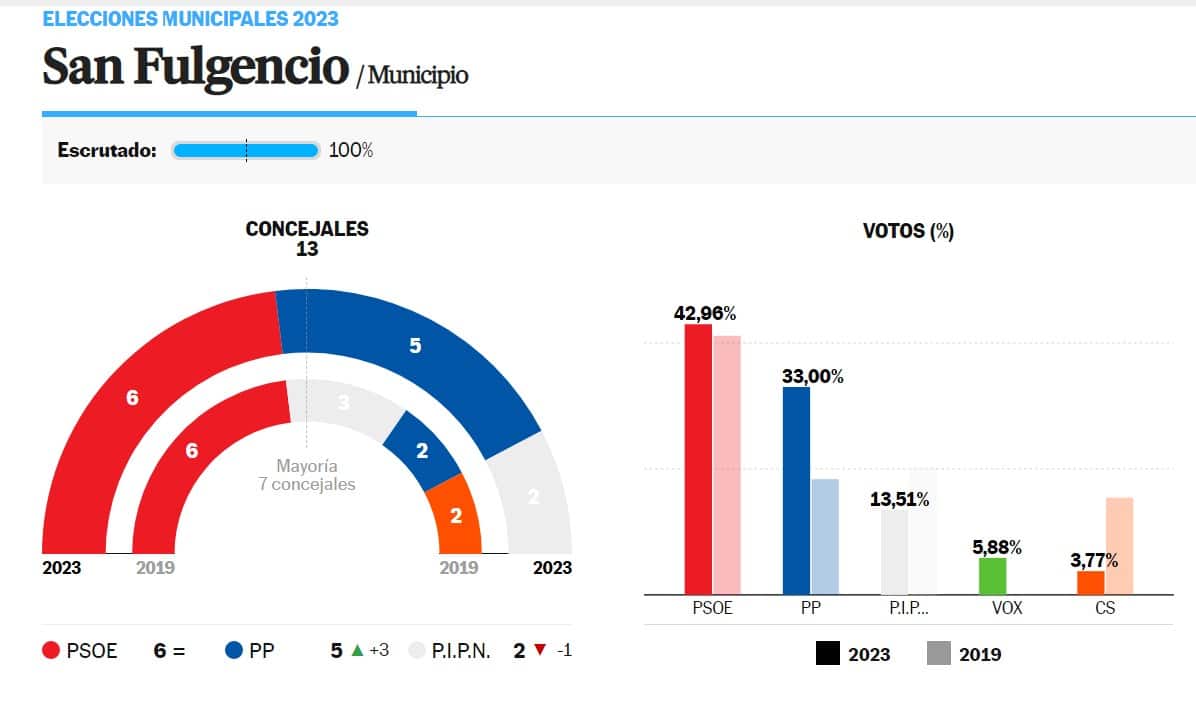 In San Miguel de Salinas, the PSOE is once again the force with the most votes with six councillors, but the PP got four, Vox two and the EU one. The socialists will need the support of the EU to govern.
In San Miguel de Salinas, the PSOE is once again the force with the most votes with six councillors, but the PP got four, Vox two and the EU one. The socialists will need the support of the EU to govern.
There will have to be agreements in Benejúzar, since the PP, although it won the elections with six councillors, failed to achieve a majority. The PSOE has five councillors but the key to government will be Cs with two councillors where we will see if they reform their coalition with the socialists or support the PP.
In Los Montesinos it was a comfortable victory for José Manuel Butrón where the PSOE obtained an absolute majority with nine councillors. The PP achieved three and EUPV one.
It was also a romp in Rafal for the socialists, where Manuel Pineda will be the mayor with seven councillors compared to the four of the PP. In Formentera del Segura, Francisco Cano will continue to govern by obtaining eight councilors for the PP, one more, compared to the three for the PSOE.
In Algorfa the Socialists maintain the majority with eight councillors, while the PP remains with three. The government of Benijófar will be run by the PP with nine councillors, increasing its majority over the PSOE with two seats.
In Benferri, the socialist Luis Vicente Mateo once again confirmed his absolute majority by obtaining five councillors compared to the four of the PP. In San Isidro, the PSOE also maintains its absolute majority with seven councillors compared to four for the PP.
In Cox, the PP will govern with nine councillors, while the PSOE won three and Vox won one. In Redován, the PP prevails again with eight councillors, an improvement of one, while the PSOE maintains it’s four, and Vox wins one.
And in Dolores José Joaquín Hernández (PSOE) will repeat as mayor with seven councillors compared to five from the PP and one from Vox.
Meanwhile the PSOE has won the Mayor’s Office in Granja de Rocamora against the PP of Javier Mora. The Socialists will govern alone in Granja de Rocamora after obtaining six councilors compared to the five of the Popular Party.
The PP snatches the mayor’s office from the PSOE in Jacarilla, where the Popular Party will govern for the next four years taking the office formerly held by the PSOE. The PP candidate, Andrés Moñino obtained a total of 624 votes (52.65%) and six councillors, compared to 543 votes (45.82%) and five councillors for the Socialists, who lose the Mayor’s Office.
Compromís won victory in Daya Vieja, the only municipality where the Valencian party has been ruling the region for four more years. José Vicente Fernández has been re-elected mayor with four councillors, compared to three for the PP. The return of Rafa Vives to the PP allows him to have representation, but in the opposition.
Ciudadanos obtained a good result in Daya Nueva, retaining four seats, the only municipality in Vega Baja where the C’s win. Its candidate, María Inmaculada Vicente, will have to agree a pact with either the PP and it’s three councilors or the PSOE with two councilors, if she is to retain control.
The PP Teresa Belmonte will continue to lead Bigastro with eight councilors, one more than in 2019. The PSOE led by Carmen Sánchez lost a councillor and is left with four while Vox enters the Council with one seat. This will be the fourth consecutive term in which the popular govern.
The Popular Party obtains the absolute majority in Almoradí with a wide margin and has obtained an absolute majority, 12 councillors, which means improving its 2019 result by two seats. The current mayoress, María Gómez, will govern alone after these elections, obtaining 12 councillors, one more than necessary for an absolute majority and two more than she obtained in the previous elections. Vox has entered the Corporation with 2 councillors.
The Socialists will continue to be the second force in the municipality, although for the PSOE the result has been worse than that of 2019, after obtaining one less councillor, falling from 5 to 4. Esquerra Unida (EUPV) has remained in Almoradí as the third force with 3 councillors, the same as in 2019.
In Pilar de la Horadada the Partido won an absolute majority with a historic result by obtaining a total of 14 councillors, three more than in the past term. The PP, headed by the current mayor, José María Pérez , once again govern the town alone, as the residents have reinforced their support. In number of votes, the party won 4,521, almost a thousand more than in the previous votes.
The PSOE lost one of its seven councilors with 2,013 votes, while Vox has entered the Pilar de la Horadada City Council with one councilor, achieving 577 support and 7.67% of the votes. The Vecinos Por el Pilar and Acuerdo para Ganar coalitions did not obtain representation.
The participation in the coastal municipality was 62.35%, according to the data offered by the Ministry of the Interior, which reflects an increase of 3.77%. This has been one of the keys on a day that took place without notable incidents and in which a total of 7,602 residents of Pilar de la Horadada exercised their right to vote.

